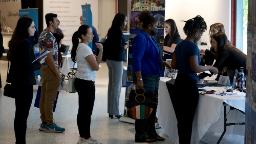
Minneapolis
CNN
—
The US economy added 311,000 jobs in February, according to the latest monthly employment snapshot from the Bureau of Labor Statistics released Friday.
That’s a pullback from the blockbuster January jobs report, when a revised 504,000 positions were added, but shows the labor market is still emitting plenty of heat.
The unemployment rate ticked up to 3.6% from 3.4%.
February’s net job gains surpassed economists’ estimates for a more modest month, with only 205,000 to be added. Separately, downward revisions to December’s and January’s totals weren’t that drastic.
While Friday’s report is a strong one, that’s actually bad news in the broader context of the Federal Reserve’s campaign to curb high inflation, said PNC Financial Services chief economist Gus Faucher.
“It’s much hotter than the economy can run, and so this means the Fed is going to have to continue to hike interest rates,” he told CNN. “And that makes a recession more likely.”
Barring a surprisingly low Consumer Price Index inflation report next week, Faucher said he expects the Fed to go forward with a half-point rate hike at its March 21-22 meeting, which would be a higher pace than the recent, more moderate quarter-point increase.
The Fed has been battling for almost a year to slow the economy and crush the highest inflation in 40 years, but the labor market continues to defy those efforts.
“Coming up on the one-year anniversary of the Fed’s first rate hike, we never thought we would see the economy churning out 311,000 more jobs this month,” said Chris Rupkey, chief economist of FwdBonds, in a statement. “The party is on and the labor market is having a blast. The economy clearly is not landing, it is soaring.”
The monthly job gains remain well above pre-pandemic norms, when roughly 180,000 jobs were added per month between 2010 and 2019, BLS data shows. However, the labor market remains tight and imbalances continue to persist in the ongoing recovery efforts from the devastating pandemic.
Labor turnover data released earlier this week for January showed that there were 1.9 job openings for every person looking for one. Fed Chair Jerome Powell has frequently highlighted how the labor market remains short of pre-pandemic growth projections by more than 3 million people.
The pandemic accelerated expected demographic trends (the aging out of the massive Baby Boom generation) with increased retirements; people also dropped out of the workforce for care-related needs and health concerns such as long Covid; and there were hundreds of thousands of workers who died from Covid.
February’s employment report showed a 0.1 percentage point increase in the labor force participation rate to 62.5% — the highest it’s been since April 2020. However, it remains below pre-pandemic levels of 63.4%.
Additionally, there was some upward movement in the jobless rate, which increased 0.2 percentage points to 3.6%.
“Contributing to upward pressure here, there were more people looking for work,” said Mark Hamrick, senior economic analyst at Bankrate.
Industries with notable job gains included leisure and hospitality, retail trade, government and health care. After being crushed during the pandemic, the leisure and hospitality has been steadily adding back employees and trying to meet increased demand from consumers shifting their spending from goods to services.
Average hourly earnings — a closely watched metric as the Fed seeks to evaluate the impact of rising wages on inflation — grew 0.2% month-on-month and were up 4.6% over the year before.

